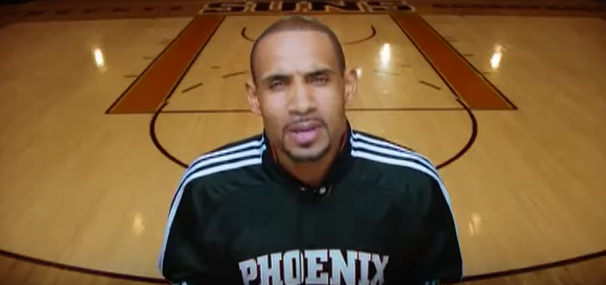
Grant Hill
Tiffany McCollins’ Memphis AAU team is on an out of town trip.Her players are in their hotel rooms. As the coach approaches one room door, she overhears a player saying to his teammate, “that’s gay, man.” She thinks, before she knocks.
After a moment, McCollins opens the door. “What’s gay?” she asks. A player replies, “Coach we were just playing. We didn’t mean anything by it.”
“Then why say it?” she says.
Several young men are playing on an outside basketball court. One says, “Welcome to my block party, glad you can make it.” Another says, “The only triple-double you get, comes with fries.” It is all fun and playful until one of the players says, “I can do this all day. Your moves are just gay.”
Just then former NBA player Grant Hill appears in the PSA and puts a halt to the exchange. “Using gay to mean dumb or stupid, not cool,” he says. His teammate at the time, Jared Dudley, adds, “Its offensive to gay people.”
In 2008, the “Think Before You Speak” campaign, aimed at raising the awareness of offensive terms used by young athletes against the LGBTQ community was launched nationally. A series of television, radio, magazine, and newspaper ads followed.
Eight years later, was the campaign successful?
“No,” says McCollins, “because (‘that’s so gay’) is still being said. It’s regular verbiage. It’s just fluid language.”
Harding Academy boys basketball coach Kevin Starks has witnessed it also. “Some teenagers think they can say anything.”
“It upsets me because it abuses the true meaning,” says Damien Herron, a 9th grader at Grizzlies Prep, who plays basketball for his church. “It’s everywhere,” he says of hearing young people call people or situations gay. “It’s in my neighborhood, school, just everywhere.”
“It’s really common,” says Martavious Hampton, Program Manager for Sexual and Minority Health, at the Memphis Gay and Lesbian Community Center. “’That’s gay’ type phrases are used all the time, typically in high schools.”
Research published by GLSEN (Gay, Lesbian Straight Education Network) supports Hampton’s opinion. According to a 2013 GLSEN survey, 47.3 percent of students who identify as LGBTQ say they hear the phrase, “that’s gay,” frequently. “Fag,” or “dyke” is heard frequently by 38.6 percent of the students in the survey. While a little more than 20 percent say they frequently hear the expression, “no homo.”
McCollins, who has coached both boys and girls middle- and high school-aged teams, says she hears the remarks only when dealing with her boys squads. “I’m not going to say (girls) don’t say it, but I don’t hear it” she explains.
“For guys it is a way to display their masculinity,” says Hampton. “It makes me feelthat there is negative connotation with males expressing their appreciation with one another. It’s part of hip-hop culture; it is part of U.S. culture to make statements like that.”
But there is a change in the trend according to GLSEN. Their latest report, completed in 2013, showed a significant decrease in homophobic remarks used by high school students. In 2001 80 percent of all students heard homophobic remarks. In 2013 the number dropped to a little more than 60 percent. The expression, “that’s so gay” continues to be most used anti-gay expression according to sampled LGBT students nationwide.
More is being done to further reduce the number, according to Hampton. “There are more conversations taking place in the schools,” he says. “There are more anti-bullying campaigns and efforts. And there are more LGBTQ (lesbian, gay, bisexual, transgender, queer and or questioning) organizations for youth.
Plus, Starks and McCollins will admit, sometimes when teens call someone or a situation gay, it is not always meant to antagonize or upset. “They may say it in jest,” says Starks. “Sometimes they don’t think of it as offensive.”
Still, it becomes the perfect time for what Starks calls a teaching moment. “If I’m not teaching guys life lessons, then I’m not doing my job. I tell them it’s not okay,” he says of players and students using anti-gay terminology. “They are not going to treat anyone with disrespect. Any time I hear my players say anything that may be offensive to anyone I address it. I like to use the quote from Maya Angelou, ‘People will forget what you said, people will forget what you did, but people will never forget how you made them feel.’”